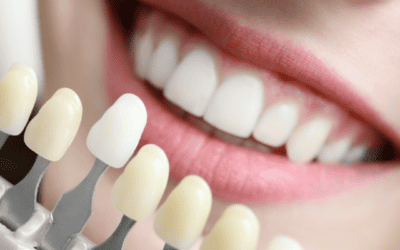Getting into good health habits from a young age is important. But what about keeping their teeth healthy and why is this important? Let’s start the year off with healthy dental habits and go back to school smiling.
Getting your child in good dental habits from a young age is crucial. Dental disease has been described as a disease of childhood. Good habits from a young age, could prevent a lifetime of disease, pain and dental discomfort. Imagine that, a life free from tooth decay and gum disease? You can set your child up for the very best chance of this by getting them into good habits from a young age.
Dental disease in Australia is actually on the rise with more than half of all 6-year-olds having some decay in their teeth.
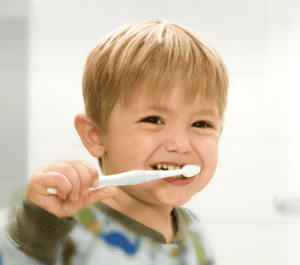
You should start caring for your child’s teeth from when they are a baby. This makes life so much easier as they get older as they are already in good routines with tooth-brushing, they’re eating a healthy diet and they are used to the 6 monthly dental trips.
However, they won’t be able to do all this themselves. They rely on parents and older friends and family members to be good role models. These caregivers are the ones buying the food that they can access in the kitchen. Children also need to help with tooth-brushing up until they are around 7-8 years old. If your child has the manual dexterity to tie their shoelaces, they can brush their own teeth, but they still need supervision to make sure they are doing it properly. They will also need help with flossing until they are around 10 years old.
What if my child has a sweet tooth?
Diet is so important. We can’t get tooth decay without sugar, so limiting sugars is key. This is easier done from a young age, before your child can develop a ‘sweet tooth’. Key diet messages are:
- Stick to water or plain milk for drinks.
- Avoid packaged and processed meals that have high sugar content
- Beware of breakfast cereals which have high sugar content
- Limit dried fruit – this is very concentrated in sugar and sticky, so it sticks to the teeth
- Watch for hidden sugars – yoghurts, dried fruit, fruit juice, cereals and other perceived ‘healthy’ foods.
- Also watch for gluten free products which tend to have higher sugar content.

Learning how to read food labels is a valuable tool. Look at the amount of sugar in grams per 100 grams. This lets you compare products.
Try to avoid snacking, as this is the most damaging to teeth. If snacks are required between mealtimes stick tooth friendly snacks, such as:
- fresh fruit and vegetables
- cheese
- bread/toast (can add avocado)
- peanut butter (no added sugar, and if no nut allergies)
- glass of milk
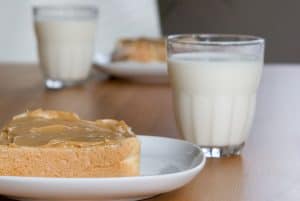
How do I care for my child’s teeth?
Make sure you are brushing your child’s teeth twice a day. You should be doing this for them until they are around 7 or 8 years old.
Use a small amount (pea-sized) of fluoridated toothpaste, and make sure they spit out (don’t swallow). Brush for 2 mins – this is enough time to get around all the surfaces of all the teeth. Try to make toothbrushing fun – make it a game, have a toothbrushing chart, use a two minute timer, or brush to their favourite song. There are plenty of toothbrushing apps too.
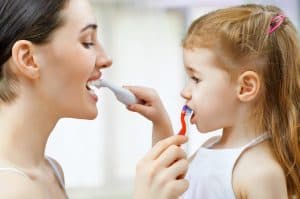
As soon as teeth come through that are next to each other, there are tight gaps where a toothbrush can’t reach. This is when flossing comes into the picture. This removes food debris and bacterial plaque from these hard to reach areas. You should floss your child’s teeth as soon as they have teeth touching. Aim to floss every day. Once your child is 10 or so, they should have the dexterity to floss their own teeth. Their dentist can also give them a flossing demo and tips to make it easier. One of the easiest ways to floss kid’s teeth is to use floss picks, which have a handle for ease.
Mouth rinses aren’t recommended for young children due to the risk of swallowing. Mouth rinses can be a valuable added extra for some people – your dentist will advise if they think a mouth rinse should be used.

When should I take my child to the dentist?
It’s best to get your child used to dental visits from a young age. If you’re going for a regular dental appointment – take your child along with you, to see that it’s nothing to worry about. Kids will mimic and copy their parents – so if they see you sitting in the chair, not scared and not in pain, they will do the same. Make going to the dentist a positive experience – make it fun and make a day of it. Many of our families combine their dentist visit with a day in Brisbane City, a trip to the museum or even Southbank. If you are nervous – don’t show this as your child will pick up on it. If you are very nervous and can’t hide it, it might be better to get someone else to take them along.
The best time to take your child to the dentist is when the first tooth comes through, or by 12 months of age if no teeth have come through yet. This lets the dentist check on the tooth development and that everything is progressing as it should. But it also gets your child used to going and to see there is nothing to fear. The dentist will be able to give you tailored advice about toothbrushing and diet. They can show you how to effectively brush and floss your child’s teeth.
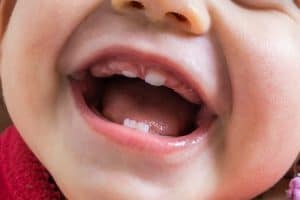
What will happen at my child’s dental visit?
Other things the dentist will check is the position of the teeth and how they bite together. As your child gets older, it’s crucial to have this monitored as any abnormalities can be picked up soon which could help prevent orthodontic problems in the future (the need for braces).
The dentist can also give you advice on habits like the use of dummies and thumb sucking and advice relating to trauma to the teeth (from falls and accidents). If your child plays a contact sport, talk to your dentist about mouthguards. The best protection for your child’s teeth is a dentist-made custom fitting mouthguard. As it is made to measure it’s more comfortable and therefore more likely to be worn. It’s also more likely to stay in your child’s mouth if they get a knock to the face and so protect the teeth better. The extra cost is worth it, as dental trauma can have long-lasting effects and need treatment for many years.
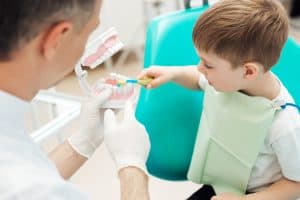
Why Baby Teeth Matter
Many people wrongly believe that baby teeth aren’t important as they fall out. However, they are important for a number of reasons:
- The baby teeth make way and guide the position of the adult teeth. Early loss of a baby tooth (due to tooth decay or trauma), can affect the position of the adult teeth as they come through. This can result in the need for orthodontic treatment.
- Healthy baby teeth also play a huge role psychologically and socially for your child. Teeth play a role in the development of speech and give kids confidence to smile and speak. They also help with eating and nutrition.
- Decayed baby teeth will eventually cause pain. This leads to days off school, loss of appetite, loss of sleep and unscheduled trips to the dentist for treatment, which can be upsetting for young children.
- Finally, if there are decaying baby teeth in the mouth when adult teeth start to come through, there is more chance of the adult teeth developing decay also.
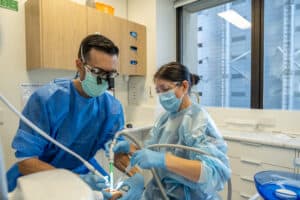
Worried about costs?
Here at Dentistry On George, we discount dental fees for all children under 18 and we accept all health funds.
Some families are eligible for free dental treatment through Medicare. This is called the Child Dental Benefits Scheme and covers $1,000 of dental costs over a 2 year period. To be eligible your child must be:
- 2 to 17 years old for at least 1 day that year
- eligible for Medicare
- getting a payment from us at least once a year, or have a parent getting a payment from us at least once a year.
If your child is due their dental check-up, or hasn’t been to the dentist before, don’t hesitate to call our friendly staff on 0732111155. We love treating children at Dentistry On George and setting them up for a life of healthy habits.


